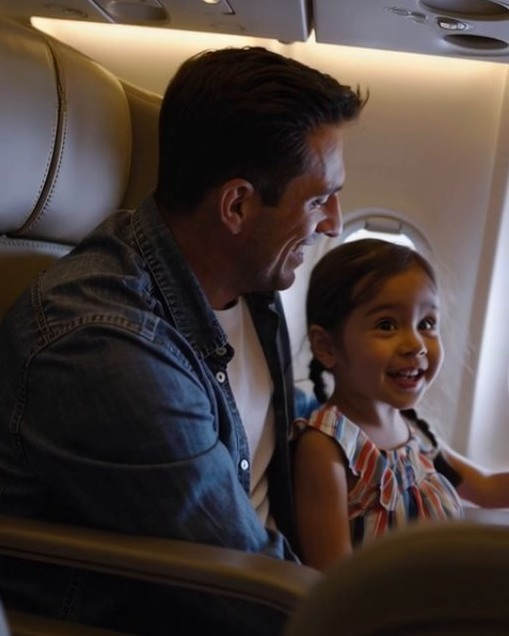“Excuse me, there must be some kind of error,” Mrs. Langford said sharply, adjusting her silk scarf as she gripped her designer handbag. Her gaze was fixed on the man settling into a first-class seat with a young girl beside him. “That man can’t possibly be assigned here.”
The flight attendant remained calm, checking the boarding pass carefully. “I’m sorry, ma’am, but Mr. Carter and his daughter are confirmed for seats 2A and 2B.”
Mrs. Langford’s lips tightened as she studied them — the man dressed in jeans and worn sneakers, carrying a faded backpack. The little girl, around six years old, clutched a juice box, her face glowing with excitement.
“This is first class, not a daycare,” she muttered under her breath, drawing a few curious glances from nearby passengers.
Mr. Carter said nothing. He gently helped his daughter into her seat and handed her a coloring book and crayons. Her smile lit up the cabin — it was her very first flight.
As boarding progressed, Mrs. Langford leaned toward nearby passengers, whispering complaints about “declining standards,” “entitlements,” and “people who don’t belong here.”
But twenty minutes into the flight, the captain’s voice came over the intercom, welcoming everyone as usual — then adding something that shifted the mood entirely.
“We’d like to recognize Mr. Carter in seat 2A. He’s just returned from his third overseas deployment and will be awarded the Medal of Honor next month. It’s our honor to have him and his daughter aboard.”
A hush fell over the cabin. Heads turned; whispers stopped.
Mrs. Langford’s face drained of color.
She sat rigid, expression unreadable. The man she had quietly dismissed was now being publicly honored. Passengers nearby glanced at Mr. Carter — some curious, some quietly moved. A few even applauded.
Mr. Carter nodded politely, avoiding attention. His focus remained on his daughter, Grace, who was happily sketching unicorns.
When the drink cart arrived, the flight attendant offered champagne. He smiled gently and declined. “Just water, thanks.”
Now visibly unsettled, Mrs. Langford leaned toward him. “Mr. Carter, I… I didn’t realize—”
He turned calmly. “It’s okay. You didn’t have to.”
Before she could say more, Grace looked up brightly. “Daddy let me pick our seats. I wanted to see the clouds!”
Mrs. Langford gave a small, tentative smile. “Good choice, sweetheart.”
Later, a man from economy quietly approached. His voice shook. “I just wanted to thank you. My brother served overseas… he never came home.”
Mr. Carter stood and offered his hand. “I’m sorry for your loss.”
The man reached into his pocket, pulling out a small silver pin. “This was my brother’s pilot pin. I think he’d want Grace to have it.”
Grace accepted it gently, eyes wide with wonder.
Mrs. Langford sat stiffly, fiddling with her bracelet, deep in thought.
When lunch was served, she hesitated, then turned to Grace. “Do you like macaroni? My son loved it when we flew. He’s grown now.”
Grace nodded. “I love it too!”
Without thinking much, Mrs. Langford smiled. “Would you like mine?”
Mr. Carter looked at her with warmth. “That’s very kind of you.”
Suddenly, turbulence jolted the plane. Grace squeezed her juice box too tightly, spilling orange juice over Mrs. Langford’s white blouse.
“Oh no!” Grace gasped, embarrassed.
Mr. Carter reached for napkins, apologizing, but Mrs. Langford simply laughed.
“It just adds character. Don’t worry, Grace. It’s only juice.”
In that moment, the tension and judgment seemed to melt away.
A little later, the captain spoke again over the intercom.
“We’d also like to acknowledge Mrs. Langford, founder of the Langford Literacy Foundation, which has supported libraries in over fifty schools. Thank you for your contributions.”
Surprise rippled through the cabin — this time, directed at her.
Mr. Carter smiled with respect. “That’s impressive.”
She gave a dry smile. “I usually keep a low profile. Expectations and all that.”
He nodded. “It matters. I taught kids overseas who’d never held a book.”
“I grew up in foster care,” she said softly. “Books saved me. People make assumptions… I guess I did too.”
He smiled kindly. “We all do.”
As the plane began its descent, Mrs. Langford pulled a small leather notebook from her purse.
“Grace, do you like to draw?”
Grace nodded eagerly.
“This is from Florence — handmade. I think a creative soul should have it.” She handed it to Grace carefully.
“Thank you!” Grace whispered, clutching it like a treasure.
Just before landing, the pilot stepped out, wearing his own medals.
“I flew evac missions out of Fallujah,” he said to Mr. Carter. “Hearing your name was an honor.”
“Thank you, sir,” Mr. Carter replied, shaking his hand.
Then the pilot turned to Mrs. Langford. “Ma’am, your books helped me through my 2006 tour. I never forgot your name.”
The three stood quietly — strangers who had, in different ways, supported others to survive.
As passengers disembarked, Grace held her new notebook tight, Mr. Carter carried their bag, and Mrs. Langford gently touched his arm.
“I judged you. I’m sorry.”
“I’ve judged others too,” he said. “We’re all still learning.”
At the terminal, she added, “We’re starting a program for military families — housing, jobs, support. I’d love to hear your thoughts.”
He smiled. “It would be an honor.”
Weeks later, a photo appeared online — Mr. Carter in uniform receiving the Medal of Honor, Grace holding her sketchbook, and Mrs. Langford in an elegant dress, with a faint orange juice stain on her scarf.
A brief moment of judgment had transformed into a lasting connection — a reminder that those we underestimate might just change the world.
